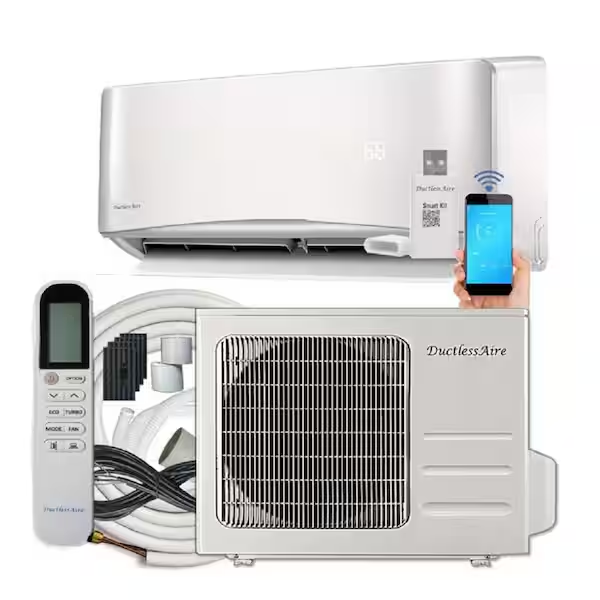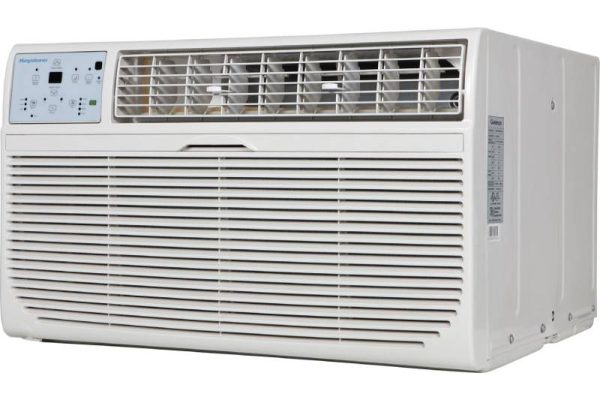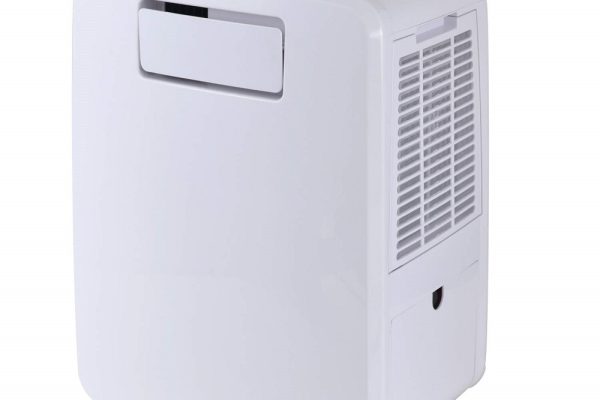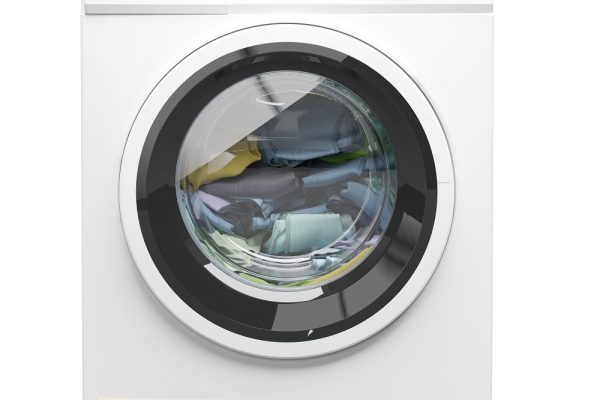Ductless air conditioners, also known as mini-split systems, have gained popularity in residential and commercial spaces. They offer a flexible, efficient, and cost-effective solution for cooling and heating. Unlike traditional central air conditioning systems, ductless units do not require ductwork, making them easier to install and maintain. This article will explore the many benefits of ductless air conditioners and how they can enhance comfort in your home and office.
What Are Ductless Air Conditioners?
Understanding Ductless Systems
Ductless air conditioners consist of two main components: an outdoor compressor unit and one or more indoor air handling units. The outdoor unit houses the compressor and condenser, while the indoor units are responsible for distributing conditioned air. These units are connected by refrigerant lines, which run through a small hole in the wall, allowing for easy installation without the need for extensive ductwork.
How Ductless Air Conditioners Function
Ductless systems work by transferring heat between the indoor and outdoor units. In cooling mode, the indoor unit absorbs heat from the room and transfers it to the outdoor unit, which releases the heat into the outside air. In heating mode, the process is reversed, with the indoor unit delivering warm air. This efficient transfer of energy reduces the overall workload and energy consumption, offering significant benefits over traditional systems.
Different Types of Ductless Air Conditioners
Ductless air conditioners come in various designs, allowing them to fit different needs and preferences. The most common types include wall-mounted units, ceiling-mounted units, and floor-mounted units. Wall-mounted units are the most popular choice for residential spaces, while ceiling and floor-mounted options may be more suitable for specific commercial applications. All these types provide flexibility in installation and can effectively cool or heat a space.
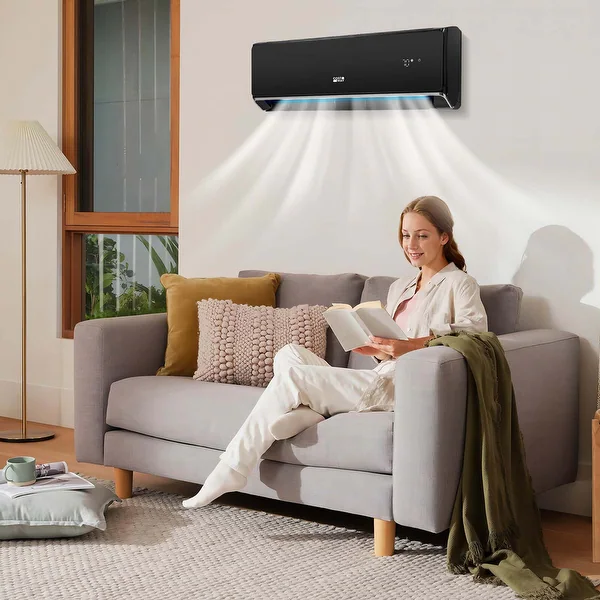
Benefits of Ductless Air Conditioner
Energy Efficiency
One of the most significant advantages of ductless air conditioners is their energy efficiency. Ductless systems typically have higher Seasonal Energy Efficiency Ratios (SEER) and Heating Seasonal Performance Factors (HSPF) than traditional systems. Ductless systems eliminate energy waste associated with ductwork, which can lose up to 30% of cooled or heated air, and deliver conditioned air directly to where it’s needed.
Cost Savings
The energy efficiency of ductless air conditioners often translates into lower utility bills. Homeowners and businesses can save significant amounts on their heating and cooling expenses. While the initial installation cost may be higher than that of traditional systems, the long-term savings in energy costs often outweigh the upfront expenses. Many utility companies also offer rebates and incentives for installing energy-efficient systems, further offsetting costs.
Improved Indoor Air Quality
Ductless systems can contribute to improved indoor air quality. Traditional duct systems can accumulate dust, mold, and allergens, which are then circulated throughout your space. In contrast, ductless air conditioners have advanced filtration systems that capture airborne particles, helping to reduce allergens and improve overall air quality. This feature is especially beneficial for individuals with allergies or respiratory conditions.
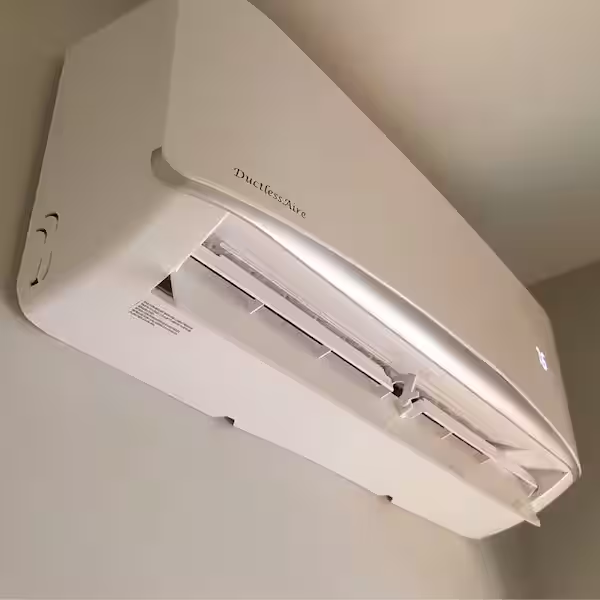
Installation Flexibility
Easy Installation Process
Installing ductless air conditioners is typically faster and easier than traditional systems. Because there is no ductwork required, installation can often be completed within a day. The compact design of ductless units allows for installation in various locations throughout a home or office, adapting to the available space.
Multi-Zoning Capabilities
Ductless systems can be tailored to allow for multi-zone cooling and heating. With multiple indoor units connected to a single outdoor unit, you can control the temperature in different areas independently. This zoning capability ensures that each room is maintained at its preferred temperature, promoting comfort and energy savings. For larger homes or offices, this flexibility can significantly improve climate control and comfort.
Aesthetic Appeal
Ductless air conditioners come in sleek and modern designs, allowing them to blend seamlessly with your interior decor. Indoor units can be wall-mounted, ceiling-mounted, or even integrated into existing architecture. This design flexibility helps maintain the aesthetic appeal of your space while providing effective heating and cooling solutions.
Enhanced Comfort Control
Quiet Operation
Ductless air conditioners operate quietly, making them an appealing choice for both home and office environments. The compressor is located outside, which minimizes noise indoors. Many indoor units are designed to operate at low noise levels, allowing for a comfortable atmosphere without disruptive sounds. This makes them an excellent choice for bedrooms, offices, or any space where noise levels matter.
Customized Temperature Settings
Ductless systems allow for personalized temperature settings. Each indoor unit can be controlled individually, meaning that different rooms can have different temperatures based on preference. This level of customization ensures optimal comfort for everyone in the space. For example, a cooler room can be created for sleeping, while a warmer setting can be maintained for areas used during the day.
Quick Temperature Changes
Ductless air conditioners provide rapid cooling and heating. Unlike traditional systems that may take time to adjust the temperature, ductless models can reach desired temperatures more quickly. This feature is particularly beneficial when entering a hot car or returning home to a cold living room. The instant temperature changes contribute to comfort and satisfaction.
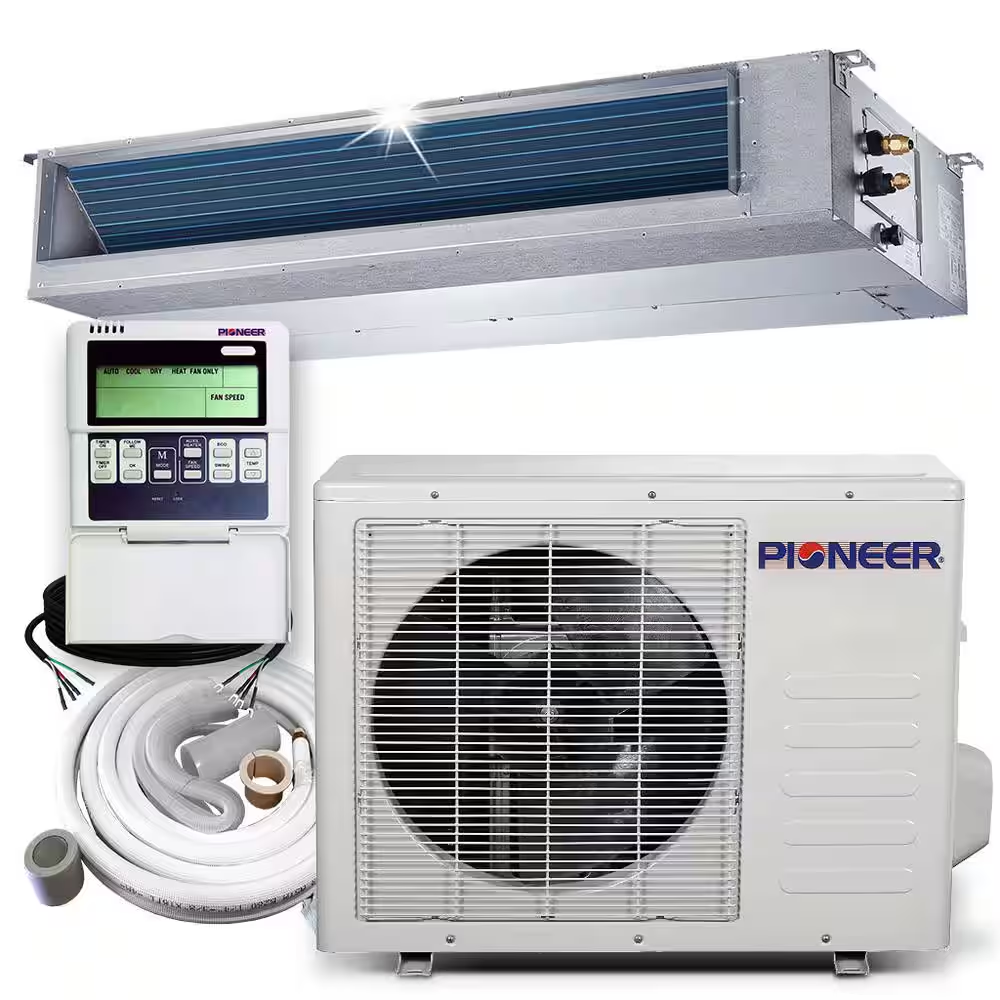
Environmental Impact
Lower Carbon Footprint
Ductless air conditioners are an eco-friendly choice due to their energy-efficient operation. By consuming less energy, they contribute to a lower carbon footprint, helping to protect the environment. Choosing energy-efficient appliances aligns with efforts to reduce greenhouse gas emissions and combat climate change.
Quiet Cooling and Heating
The quiet operation of ductless systems not only enhances comfort but also minimizes noise pollution. Compared to traditional air conditioning units, which can be quite loud, ductless systems promote a peaceful environment. This benefit is particularly important in urban areas where noise can contribute to stress and discomfort.
Maintenance and Care
Minimal Maintenance Requirements
Ductless air conditioners generally require less maintenance than traditional HVAC systems. While routine maintenance is still important, such as cleaning the filters regularly and checking the refrigerant levels, the absence of ductwork means fewer parts to inspect. This makes them easier to maintain for busy homeowners and property managers.
Cleaning the Filters
Regularly cleaning the air filters is crucial for maintaining optimal performance and efficiency. Clogged filters can reduce airflow and lead to higher energy consumption. Ductless units typically feature easily accessible filters, allowing you to clean or replace them every few months to maintain efficient system operation.
Professional Servicing
Although the maintenance needs are minimal, scheduling a professional service check is beneficial at least once a year. A technician can inspect the system, perform necessary adjustments, and check the refrigerant levels. Regular professional servicing can increase the lifespan of the unit and ensure that it operates at peak performance.
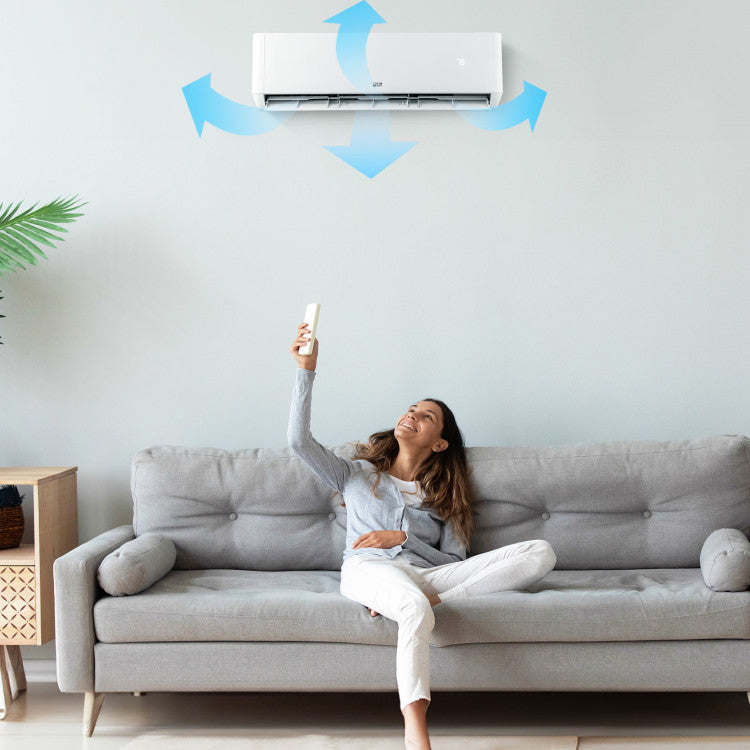
Choosing the Right Ductless Air Conditioner
Assessing Your Space
When selecting a ductless air conditioner, consider the size of your space. Calculate the square footage of the area you wish to cool or heat to determine the required BTU (British Thermal Unit) rating for optimal performance. An oversized unit may lead to inefficient operation, while an undersized unit will struggle to maintain temperature.
Comparing Brands and Models
Conducting research on different brands and models can help you choose the right ductless air conditioner. Look for features that align with your specific needs, such as energy efficiency ratings, zoning capabilities, and advanced technology. Reading customer reviews also provides insights into real-world performance and reliability, ensuring that you invest in a quality product.
Professional Installation
To achieve the best results, hire a professional to install your ductless air conditioner. Some may try to cut costs with a DIY installation, but professionals set up the unit correctly and ensure it operates at peak performance. Trained technicians can also assist in locating the best placement for indoor units, maximizing efficiency and comfort.
FAQ:
1. What is a ductless air conditioner, and how does it work?
Answer: A ductless air conditioner, also known as a mini-split system, is an air conditioning unit that does not require ductwork to distribute cool air. It consists of an outdoor compressor unit and one or more indoor air handling units. These systems work by drawing in air and passing it over an evaporator coil, where refrigerant absorbs the heat. The cooled air is then blown directly into the living space, providing efficient and targeted cooling without the need for ducts.
2. What are the main benefits of using ductless air conditioners?
Answer: The main benefits of ductless air conditioners include:
- Energy efficiency: They typically have higher SEER (Seasonal Energy Efficiency Ratio) ratings compared to traditional systems, leading to lower energy bills.
- Zoned heating and cooling: Each indoor unit can be controlled independently, allowing for customized comfort in different rooms according to personal preferences.
- Space-saving design: Without the need for ductwork, ductless systems take up less space and can be installed in areas where traditional systems cannot.
- Easy installation: Ductless systems require only a small hole in the wall for installation, making them less invasive than conventional systems.
3. Are ductless air conditioners suitable for all types of homes?
Answer: You can install ductless air conditioners in a wide variety of home types, including single-family homes, apartments, and condominiums. They benefit homes without existing ductwork or additions needing extra cooling. However, suitability depends on specific climate conditions and the space’s size, so consult an HVAC professional to assess your needs.
4. How do ductless air conditioners compare to traditional central air systems?
Answer: Ductless air conditioners differ from traditional central air systems in several ways:
- Installation: Central air systems require extensive ductwork, while ductless units are easier and quicker to install.
- Energy efficiency: Ductless systems often have higher energy efficiency ratings due to reduced energy losses associated with ducts.
- Zoning capabilities: Ductless systems allow for zoning, meaning different rooms can have different temperatures, while central systems typically cool the entire house uniformly.
- Cost considerations: While ductless systems generally have higher upfront costs per unit, they tend to offer savings on energy bills in the long run.
5. What maintenance do ductless air conditioners require?
Answer: Maintenance for ductless air conditioners is relatively straightforward:
- Regular filter cleaning or replacement: Clean or replace the air filters monthly or as needed to ensure optimal airflow and efficiency.
- Outdoor unit upkeep: Keep the outdoor unit free of debris, leaves, and obstructions to ensure proper air circulation.
- Periodic professional servicing: Schedule professional inspections and maintenance at least once a year to check refrigerant levels, inspect coils, and ensure efficient operation.
By adhering to these maintenance practices, you can prolong the life of your ductless air conditioning system and maintain its efficiency.
Conclusion: Embrace the Benefits of Ductless Air Conditioners
In conclusion, ductless air conditioners offer numerous advantages for both residential and commercial spaces. Their energy efficiency, ease of installation, and ability to provide personalized comfort empower homeowners and tenants to create ideal living environments. When selecting a ductless air conditioner, consider factors such as space, brand reputation, and installation options to ensure the perfect fit for your needs.
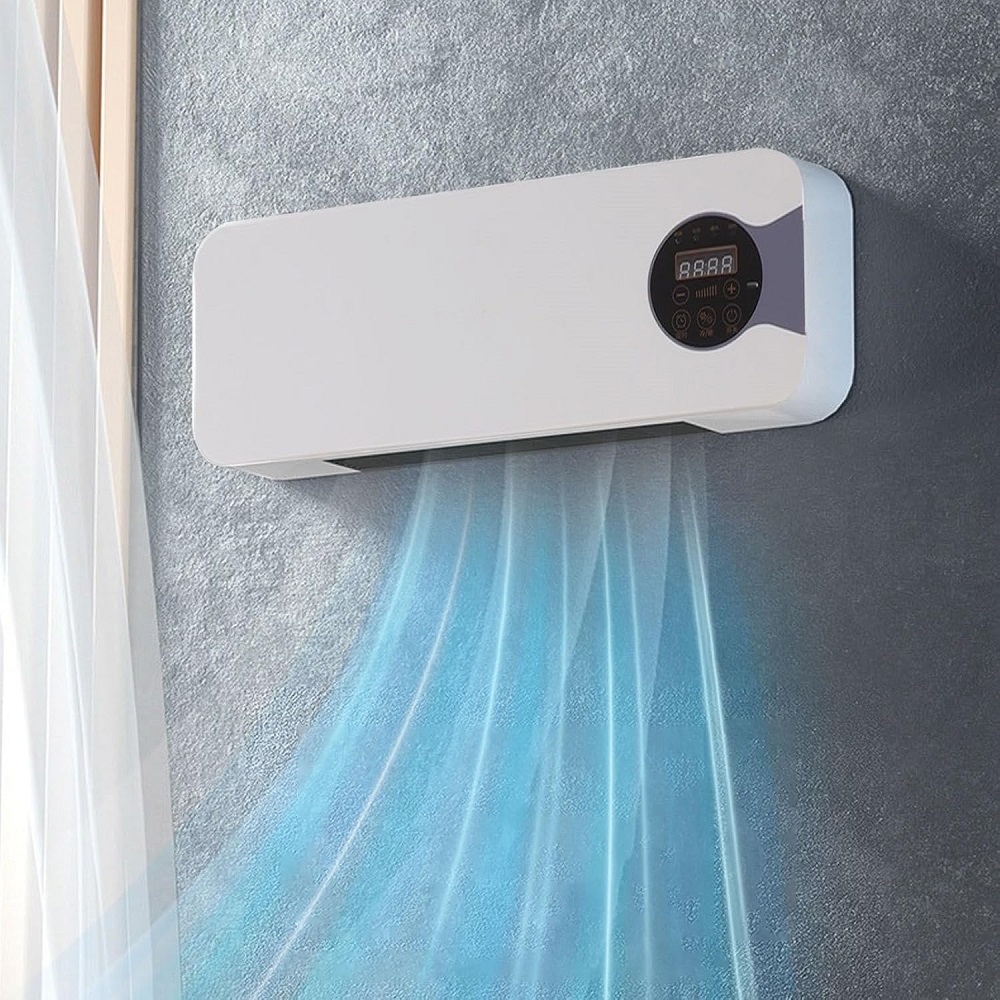
The Right Choice for Comfort and Convenience
Investing in a ductless air conditioner is a decision that brings comfort and convenience year-round. These systems can provide efficient cooling in summer and effective heating in winter. With the fluctuating nature of our climates, having a reliable heating and cooling solution is essential for maintaining an enjoyable living or working environment.
A Sustainable and Efficient Solution
Choosing a ductless air conditioner aligns with environmental responsibility as it reduces energy consumption and minimizes noise pollution. By picking energy-efficient systems, you contribute to lower carbon emissions. Enjoy the peace of mind that comes from knowing your comfort does not come at the expense of the environment.
Enjoy Your Indoor Space
With an understanding of the advantages, practical applications, and even the cost of installing ductless air conditioners, you can make an informed decision to enhance your indoor space. Embrace modern technology and enjoy the benefits of a versatile, efficient, and quiet climate control solution. Whether at home or in the office, a ductless air conditioner can provide a more comfortable and enjoyable environment for everyone.
